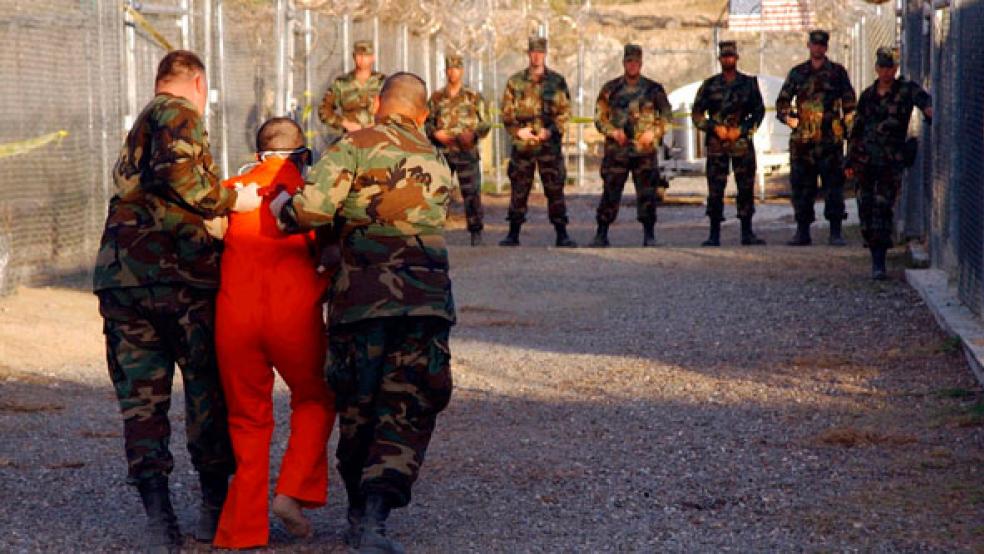The White House has decided to delay releasing its plan to close the U.S. detention facility at Guantanamo Bay, Cuba, dealing the Obama administration another political setback in a week that has been rife with them.
A Defense Department official told Politico the proposal, which had been widely-expected this week, is being held up for financial reasons and insisted it has nothing to do with the backlash over President Obama’s possibly using an executive order to close the controversial prison or the ISIS attack in Paris that killed at least 129 people.
Related: Obama Readies Biggest Reach of Presidential Power Yet
The decision to hold off on unveiling the plan comes at a politically shaky time for the administration, as it’s become embroiled in a new political fight with the GOP-controlled Congress over the fate of Syrian refugees who want to resettle in the U.S.
Worried that ISIS or other terror groups could use the refugee crisis that has gripped Europe in recent months to sneak operatives onto American soil, the House is slated to vote Thursday on Republican-backed legislation that would “pause” resettlement efforts until lawmakers receive assurances of more robust background checks and vetting. Only then could the president move ahead with his plan to welcome 10,000 refugees in the coming year.
The White House announced Wednesday it would veto the bill because the proposed requirements “would provide no meaningful additional security” for the country.
Republicans have used the Paris attacks and the resulting refugee debate to heap fresh criticism on the president’s efforts to defeat ISIS, saying he lacks a concrete plan to destroy the group. The barbs have apparently gotten to Obama; during news conferences in Turkey and the Philippines this week the president seemed to be irritated by questions about his ISIS strategy.
Related: Lindsey Graham Wants to Declare War on ISIS, but Is Anyone Listening?
Republicans, some of whom threatened to take Obama to court if he closed Guantanamo unilaterally, now see the delay as another opportunity to keep the president on his heels.
In a statement, House Speaker Paul Ryan (R-WI) said, “frankly there should have never been such a plan in the first place.”
He and others highlighted congressional testimony from earlier this week by Attorney General Loretta Lynch which implied that transferring Guantanamo detainees to the U.S. would break the law, such as the recently passed defense policy bill which contains a provision barring such actions.
“The administration’s time would be better spent on a plan to defeat ISIS than on one to move terrorist detainees to our homeland. This delay should be permanent,” according to Ryan.
"Once again, the president has been forced to confront the hard reality of Islamic terrorism and admit that closing the detention facility at Guantanamo Bay isn't as easy as it sounds on the campaign trail,” said House armed services committee chair Mac Thornberry (R-TX). “Going back to the drawing board on a vague, ill considered 'plan' is a good start.”
Related: Jeb Bush: We Need U.S. Ground Troops to Fight ISIS
Speaking on the Senate floor Thursday morning, Majority Leader Mitch McConnell (R-KY) said, “the reality of closing the secure detention facility is a lot harder than making promises on the campaign trail,” a reference to a pledge Obama made during the 2008 presidential race.
“It’s an incredibly complex issue with grave national security concerns for the citizens of our country and our allies. That fact that the president has never been able to present any kind of serious plan to Congress seems to say a lot,” he said, adding lawmakers “will of course keep an open mind” if and when the strategy is delivered.
On Wednesday, the attorneys general of Colorado, Kansas and South Carolina – three states the Pentagon has scoured for alternative detention facilities – sent a letter to the president that cited the Paris attacks and urged him not to use executive action to send inmates to their states, claiming it would “violate federal law.”
On Sunday, the Pentagon announced it was transferring five Yemeni detainees to the United Arab Emirates, bringing the prison population down to 107 – a far cry from the 800 inmates it once held. Of those remaining, 48 have been approved for transfers.
Regardless of when the president’s plan is delivered, with only 14 months left in Obama’s term the administration will likely push to send those 48 to other countries faster. Doing so would raise the cost per-prisoner of those remaining and reinforce the White House’s long-standing argument that the detention site is an expensive drain on U.S. national security.
The prison has cost the American taxpayers nearly $5 billion since it opened in 2002, according to the American Civil Liberties Union, and each detainee costs taxpayers millions annually.





